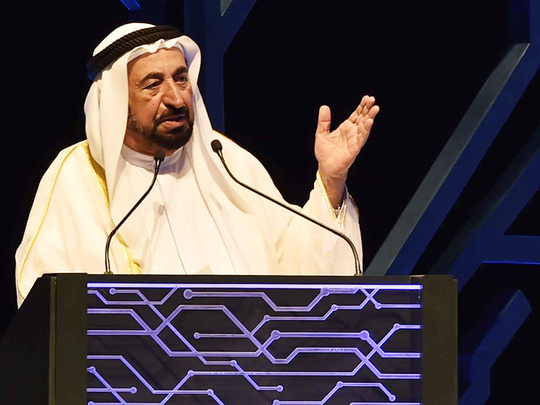
Sharjah: In the hands of wrongdoers, technology such as social media and smart devices is a dangerous weapon, especially when aimed at children, warned His Highness Dr Shaikh Sultan Bin Mohammad Al Qasimi, Member of the Supreme Council and Ruler of Sharjah.
His comments came during his address at the opening ceremony of the International Government Communication Forum (IGCF) at Expo Centre Sharjah on Wednesday.
Dr Shaikh Sultan said such technology has the power to mislead children and control them as puppets wherever they are, describing its overuse as an addiction. He added that adults and leaders have a responsibility to keep a watchful eye of children’s use of such means of communication, whose proliferation has become chaotic.
- Dr Shaikh Sultan
He described the trend as a bulldozer flattening everything in its path. However, Dr Shaikh Sultan said society should not close the doors on such technology, but rather use knowledge to prevent its misuse. He said only when we immunise society against the negative aspects of such means, can we embrace and promote this kind of digital technology. The Sharjah Ruler called on IGCF delegates to find answers to this predicament.
He also spoke about the need for the Arab world to supersede the “defeat of 1967”, alluding to the war in that year between Arab states and Israel. Dr Shaikh Sultan called on the Arab world to learn from the success stories of other nations who prospered even though they had lost wars, such as Germany, South Korea and Japan.
Earlier in Wednesday’s ceremony, Shaikh Sultan Bin Ahmad Al Qasimi, chairman of Sharjah Media Council, described what the world could be like in 2045, where children could have chip implants, instead of mobile phones, to communicate or be linked to thousands of computers. He said such ideas may seem impossible but 20 years ago smartphones were also a distance thought. His point was that today we are at the brink of an era where current technology will become obsolete, replaced by a digital revolution, which has removed the barriers between the government and the governed.
Shaikh Sultan said technology will change the way we communicate and governments cannot afford to lag behind in adopting the latest trends.
Over 40 speakers from 16 countries will be participating in 11 discussion panels addressing diverse themes like ‘Digital Diplomacy in Government Communication’, ‘Media Charisma’, ‘New Media in Serving Humanitarian Issues’, and ‘The Future of Communication’.
The forum’s programme will showcase the best practices and pioneering expertise in this field. It comprises training workshops conducted by a host of global organisations’ representatives and several media and technology companies.
Wednesday’s speakers include Ameenah Gurib-Fakim, President of Mauritius; Sir Timothy John Berners Lee, inventor of the World Wide Web and president of the Open Data Institute; and Tanmay Bakshi, said to be the youngest Artificial Intelligence (AI) expert in the world and member of IBM’s AI Team in Canada.
Gurib-Fakim spoke about the “dark underbelly” of ‘Big Data’ in the context of the ongoing controversy that a firm called Cambridge Analytica allegedly exploited the data of millions of Facebook users to influence elections.
Sir Timothy said “targeted advertising”, which is what is claimed to have happened in the controversy to influence voters, was “too powerful” to be used in politics and should be banned in politics. This, he implied, would remove the demand for data of Facebook or social media users so they can be profiled for certain political messages.
Speaking about AI, Tanmay said AI should not be feared as it will not replace, but rather aid, our jobs. He provided the example of machines flagging early warning signs of disease so physicians can prevent ailments before they occur. He also said AI has a role in government, illustrating his point by saying AI is routing scores of petitions from people to the right department in Mexico within seconds, saving manpower and time.
The two-day IGCF ends on Thursday.








